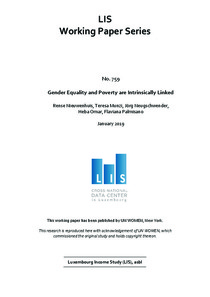Gender equality and poverty are intrinsically linked
"This discussion paper provides an updated analysis of gendered economic inequality in high- and middle-income countries. A review of the literature demonstrates that such an analysis needs to explicitly recognize that gender, poverty and (economic) inequality are intrinsically linked. Specific...
| Main Authors: | , , , , |
|---|---|
| Institution: | ETUI-European Trade Union Institute |
| Format: | TEXT |
| Language: | English |
| Published: |
Luxembourg
2019
LIS |
| Subjects: | |
| Online Access: | https://www.labourline.org/KENTIKA-19306235124911244179-Gender-equality-and-poverty-ar.htm |
| _version_ | 1771659897535987712 |
|---|---|
| author | Nieuwenhuis, Rense Munzi, Teresa Neugschwender, Jörg Omar, Heba Palmisano, Flaviana |
| author_facet | Nieuwenhuis, Rense Munzi, Teresa Neugschwender, Jörg Omar, Heba Palmisano, Flaviana |
| collection | Library items |
| description | "This discussion paper provides an updated analysis of gendered economic inequality in high- and middle-income countries. A review of the literature demonstrates that such an analysis needs to explicitly recognize that gender, poverty and (economic) inequality are intrinsically linked. Specifically, the paper addresses two sets of questions: First, how do intrafamily resource allocation and distribution patterns both reflect and shape gender inequalities in power and well-being, and what factors—including policyrelated ones—can mitigate these inequalities? Second, how do families as gendered institutions contribute to broader socio-economic inequalities, and what can be done to reduce/reverse these inequalities? Using data from the LIS Database, this paper shows considerable differences among 42 countries with respect to how likely women were to have their own income. The period from 2000 to 2010/2014 saw increasing rates of own incomes as well as women’s incomes constituting larger shares in total household income. A key finding is that in countries where many women have an income of their own, relative poverty rates are lower. The comparative analyses, combined with a review of the literature, suggest that welfare state arrangements that support working women not only improve the overall employment rates of women but also help to prevent particularly women in low-income households from living in dependence and instead to have an income of their own—thus reinforcing the potential for poverty reduction. Moreover, institutional contexts that are generally conducive to women’s employment tend to be effective across family forms." |
| format | TEXT |
| geographic | international |
| id | 19306235124911244179_d01c9b1f4e7c4a4e9d08b8cec71ad6bb |
| institution | ETUI-European Trade Union Institute |
| is_hierarchy_id | 19306235124911244179_d01c9b1f4e7c4a4e9d08b8cec71ad6bb |
| is_hierarchy_title | Gender equality and poverty are intrinsically linked |
| language | English |
| physical | 30 p. Digital |
| publishDate | 2019 |
| publisher | Luxembourg LIS |
| spellingShingle | Nieuwenhuis, Rense Munzi, Teresa Neugschwender, Jörg Omar, Heba Palmisano, Flaviana gender equality poverty welfare state Gender equality and poverty are intrinsically linked |
| thumbnail | https://www.labourline.org/Image_prev.jpg?Archive=137393595557 |
| title | Gender equality and poverty are intrinsically linked |
| topic | gender equality poverty welfare state |
| url | https://www.labourline.org/KENTIKA-19306235124911244179-Gender-equality-and-poverty-ar.htm |

